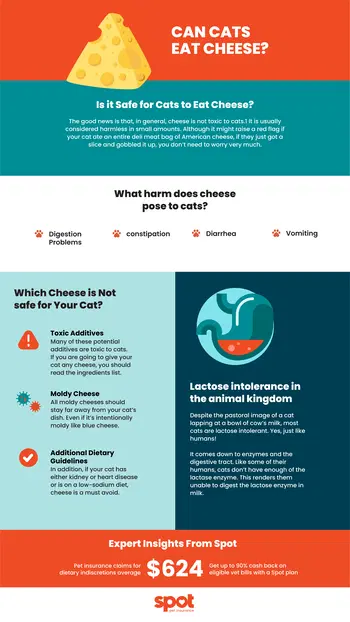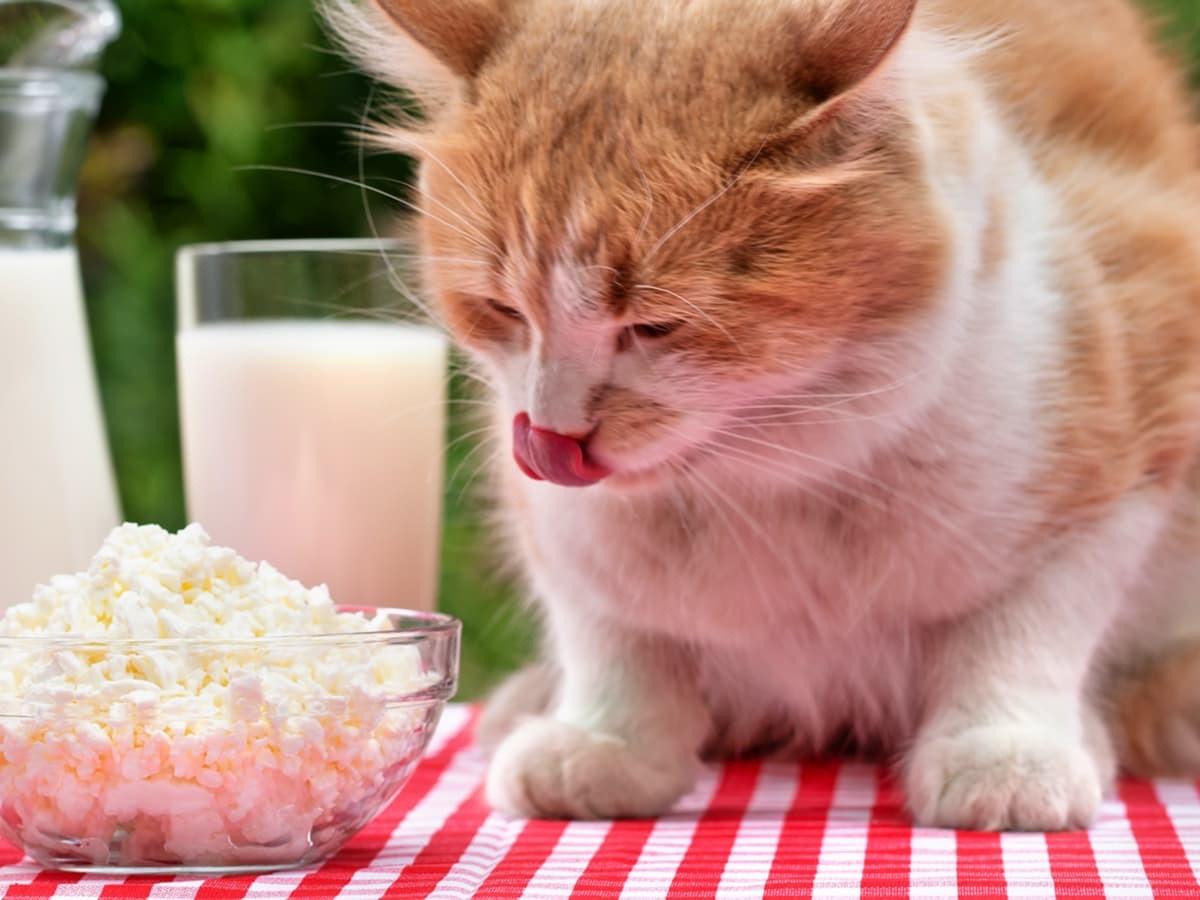We bet you didn’t expect your feline friend to reveal to you that they enjoy eating cheese, too! When you think of cheese enthusiasts, you probably conjure up images of mice, not their natural predators, cats. However, some cats enjoy eating cheese.
Humans love cheese. Some of us believe that a party is simply not a party without a well-thought-out charcuterie board.
If your dog or cat is prone to begging by the table, perhaps you have seen them eyeing your delightful spread of brie with keen interest. Has your cat ever snuck a piece off your plate; their large eyes seemed to glow even more brightly (and somehow more adorably than usual)?

What’s The Deal With Cats and Cheese?
Should your cat join you for a cheese tasting? Because this is not a food cats regularly eat, you may be looking for additional information regarding the safety of this snack.
At Spot Pet Insurance, our priority is helping ensure that your pet has everything they need and nothing they don’t (including foods that tempt your cat). That’s why we are passionate about giving you the information you need to help make the healthiest decisions for your pet. Today, we will do a total review of foods that are considered feline-safe and cat-approved.
Why is cheese so eye-catching to your feline friends? Can they have a nibble or even more? Continue reading to learn everything you need to know about feeding your cat cheese.
Is It Safe For Cats To Eat Cheese?
You see your pet munching on an unknown object, and you immediately yell out, “What’s in your mouth?” While your pet can’t answer you, it seems like they are trying to swallow whatever they have even faster.
If your cat got into your bag of shredded cheese, perhaps you're wondering if you need to call your vet or not.
The good news is that, in general, cheese is not toxic to cats.1 It is usually considered harmless in small amounts. Although it might raise a red flag if your cat ate an entire deli meat bag of American cheese, if they just got a slice and gobbled it up, you don’t need to worry very much.
When Is Cheese A Cause For Concern?
If your pet recently ate a cheese they haven’t had before and now they’re throwing up, lethargic, or otherwise acting unlike themselves, bring them to the vet to make sure they are okay. Luckily, this will most likely not be necessary.
If you are looking to share a snack with your feline best friend or are inquisitive about a particular type of cheese, always reach out to an expert.
Make sure that the cheese you intend to serve is up to par in terms of quality and that the specific type won’t lead to gastrointestinal distress. Last (but certainly not least), consider your pet’s individual state of health before you throw them some cheese.
Are There Any Benefits From Feeding Cats Cheese?
Although cheese is a tasty snack that appeals to many across the animal kingdom, cats do not need cheese to maintain their health. In fact, in some cases, cheese could lead your pet to gastrointestinal distress. It may seem like your cat likes to eat just about anything; cats actually have fairly specific dietary guidelines.
The Obligate Carnivore: A Cat’s Dietary Requirements
People generally divide species into three categories: herbivores, carnivores, and omnivores. Animals like cattle, elephants, and horses are herbivores; they can only eat plant life. Dogs are omnivores; they can survive off plants and meat. Dogs can eat meat like carnivores, but they are not obligate carnivores.
Obligate carnivores are animals like the leopard gecko, the polar bear, and the cat. Obligate carnivores cannot rely on plants to survive; their vast majority of nutritional needs will be met by consuming meat.
The obligate carnivore diet is largely dictated by missing a particular enzyme that turns carotene from plants into vitamin A. As such, your cat’s digestive system is finely attuned to eating a meat diet. Remember that cheese (and any other snacks you may feed your pet) is never a substitute for the quality cat food they require to live their happiest, healthiest life.
Although cheese might be a yummy snack for your cat, eating cheese has essentially no nutritional value for cats.2 This is just one reason why vets usually caution loving pet owners against feeding their cats too much cheese.
Don’t despair, as the menu for cats is constantly expanding. A fun alternative to traditional cheese is to give your cat cheese-flavored treats specifically designed for felines. This can help satisfy your cat’s cheese craving while also providing treats designed for their unique status as obligate carnivores.
What Harm Can Cheese Pose To Cats?
Cheese doesn’t really help, but sadly, it can hurt.
Evolution transformed wild cats and their descendants into incredible predators with complex and fascinating social structures. However, it did not prepare them for a happy hour snack with their loving human.
Thanks to evolution, every cat has a unique digestive tract. While some cats can consume a small amount of cheese without having any problems, other cats will have an extremely difficult time consuming and ingesting cheese.
If you find that your cat cannot eat cheese without getting a bellyache or vomiting, it’s time to take it away from them, no matter how much they seem to love it.
Lactose Intolerance In The Animal Kingdom
Cats are prone to certain food and environmental allergies.3
Despite the pastoral image of a cat lapping at a bowl of cow’s milk, most cats are lactose intolerant. Yes, just like humans!
What causes lactose intolerance? What makes milk so potentially troublesome? Once again, it comes down to enzymes and the digestive tract. Like some of their humans, cats don’t have enough of the lactase enzyme. This renders them unable to digest the lactose enzyme in milk.
This means that if you give your cat some cheese, you could significantly contribute to their bellyaches. In some more severe cases, cheese could actually lead your kitty to develop digestion problems, including constipation, diarrhea, or vomiting.
Ultimately, it’s best to avoid giving your cat cheese, as the unknowns far outweigh the benefits. Of course, if you have any questions about this, you should reach out to a trusted vet. As a general rule of thumb, if you think that your cat might potentially have an allergy to milk or dairy, stay away from giving them cheese.
Think of it this way: there aren’t any health benefits associated with cheese anyway. Instead, give your cat cheese flavored treats that won’t wreak havoc on their digestive system.
Is There Any Type Of Cheese That Is Cat Safe?
Consider the type of cheese that you want to give your feline friend. Some are worse than others. For example, soft cheeses have a higher lactose content compared to their hard counterparts.
Take a peek at the label to see what other additives are in the cheese you are looking at. For instance, if the cheese contains garlic, chives, onions, or other additional elements, you could be setting your pet up for disaster.
Toxic Additives
Many of these potential additives are toxic to cats. Hypothetically, you could give your cat a toxic piece of cheese if it has an unknown additive in it. If you are going to give your cat any cheese, you should read the ingredients list. This will reduce the odds of accidentally feeding your cat something dangerous.
Moldy Cheese
What about moldy cheese? You would never eat cheese that has gone bad, but what about intentionally molded ones, like blue cheeses? It’s the same difference for cats. All moldy cheeses should stay far away from your cat’s dish.
Additional Dietary Guidelines
In addition, if your cat has either kidney or heart disease or is on a low-sodium diet, cheese is a must avoid. If your cat has a condition requiring a list of dietary restrictions, many pet owners find it helpful to keep this list taped to their fridge or cabinet.
Expert Insights From Spot
While sharing our favorite foods with our pets can be tempting, it's important to remember that not all human foods are safe for our cats. Spot's internal data shows that pet insurance claims for dietary indiscretions average $642*, highlighting the importance of caution and research before sharing snacks with your pets.
No Cheese, Please
Even the most loving and diligent pet owners can find their fur babies getting into things they shouldn’t. Luckily, your vet is only a phone call away, and Spot Pet Insurance makes it our goal to make it easier to be the very best pet parent that you can be.
Whether you have questions regarding which pet food is best or need help ensuring that your cat didn’t get something unsafe, we are always looking for ways to make it easier to treat your pet the best.

With 15 years as a dog and cat parent, my pet articles are a mix of humor and firsthand experience - proof that the best stories often come with paws and purrs.
*Jan 2019 to Aug 2024 administrator claims data.
Mitchell, Sandra C. “Can Cats Eat Cheese?” PetMD, 16 Aug. 2023, www.petmd.com/cat/nutrition/can-cats-eat-cheese.
Geiger, Rebecca. “Can Cats Eat Cheese? Everything You Need to Know.” BeChewy, 14 Mar. 2023, be.chewy.com/nutrition-pet-diet-tips-can-cats-eat-cheese/.
Llera, Ryan. “Food Allergies in Cats," VCA Animal Hospital, n.d., vcahospitals.com/know-your-pet/food-allergies-in-cats.
The information presented in this article is for educational and informational purposes only and does not constitute or substitute for the advice of your veterinarian.











